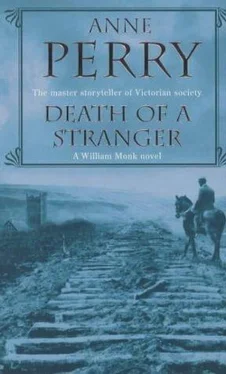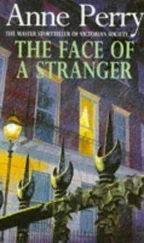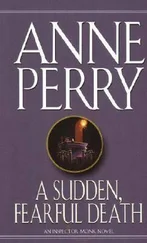“So you say,” she agreed, resisting the impulse to snatch at them. “We will add them up, deduct a little for… accidents, and come to a figure to present.” She inclined her head at Rathbone, but carefully avoided using his name.
Squeaky still held tight onto the papers.
Hester looked at Rathbone again.
Rathbone pursed his lips and started to stand up.
“All right!” Squeaky thrust the papers at Hester. “But only in that room, mind. They’re worth a lot of money.”
“Of course,” Rathbone agreed. “Or I would not be willing to put my own money into the venture.”
Hester took the papers from Squeaky’s reluctant fingers and walked straight over to the doorway, expecting any moment to hear Squeaky’s footsteps behind her. She reached the door with relief and opened it, then closed it again behind her. Margaret looked up at her, her face pale and tight with tension. She gulped when she saw the papers in Hester’s hand, and relaxed a fraction.
Hester looked at them just long enough to be certain that they were the original signed IOUs, not copies of anything in Squeaky’s own hand. When she was satisfied that they were, she looked up and nodded to Margaret.
Margaret took them and went to the fireplace. She put a taper to the gas flame in the light, caught fire to it, then, sheltering it with her hand, bent down and set it to the papers, all in absolute silence.
Hester stood with her back against the door, her heart pounding.
The flames caught and flared up. Margaret watched until there was nothing left, then took the tongs and crushed the blackened pieces. She turned around to Hester, a smile of triumph on her face.
Hester picked up the ledger. “Do you want to?” she invited her.
Margaret shook her head. “It’s yours,” she replied. “But I want to watch.”
Hester made a little beckoning gesture, then opened the door with her free hand and went back into the room with Squeaky and Rathbone.
Squeaky looked up. “Well?” he demanded. “Didn’t I tell you?”
“You did,” Hester agreed, putting the ledger down on the desk in front of him. “There was a lot of money owed. But since I have just burned the IOUs, you will not be able to collect it.”
Squeaky stared at her in incomprehension. It was too terrible for him to grasp.
Even Rathbone seemed startled. He had expected her to leave Squeaky to find that out for himself when they were well outside the place. He looked a trifle taken aback.
“You… you fool!” Squeaky screeched as the truth of it dawned on him. “You… you…”
“Not a fool, Mr. Robinson,” Hester said calmly, although her hands were sweating and she knew she was trembling. “It was precisely what I intended to do.”
“I’m ruined!” Squeaky’s face was red, his eyes bulging. He held out his hands as if he were thinking of actually grasping hold of her and strangling her.
She took a step backward just as Rathbone stood up. “No you won’t,” she said chokingly. “I have an idea how you could use this place… really quite well.”
“You what?” Squeaky said with total disbelief. She was monstrous! Beyond credibility.
“I… I have an idea,” Hester repeated. “We need new premises, better than we have now, and cheaper…”
“Cheaper?” Squeaky yelled. “You should pay me compensation! That’s what you should do… you… you lunatic!”
“Nonsense!” she said briskly. “At least you will stay out of jail. You can run this place as a hospital for the sick and injured. There’s plenty of room.”
He gulped and choked.
“The money can be raised by charity,” she went on in the deafening silence. “You’ve got lots of young women here who could learn to be nurses. It would-”
“Gawd Almighty!” Squeaky burst out in anguish.
“Hester!” Rathbone protested.
“It seems like quite a good bargain to me.” Hester adopted an air of utmost reason.
Squeaky turned to Rathbone to appeal to him.
“I’m sorry,” Rathbone said, a strange lift in his voice, as if he were teetering on the edge between horror and laughter. “I have no intention of investing in your business, Mr. Robinson. Unless, of course, you adopt Mrs. Monk’s suggestion? I had no idea that she had such a thing in mind, but it seems to me something to which I could donate a certain amount, and possibly find others who would do the same.” He took a deep breath. “I appreciate that it would ruin your reputation among your colleagues, but it might earn you a certain leniency in other directions.”
“What other directions?” Squeaky wailed. “You’re asking me to be worse than legitimate! It’d be downright… good!” He said the word as if it were damnation.
“The law,” Rathbone said reasonably. “I am a barrister.” He bowed very slightly. “Sir Oliver Rathbone, Q.C.”
Squeaky Robinson let out a long, wordless groan.
“Then we will all be well suited,” Hester said with satisfaction.
“We shall even be able to tell Mr. Jessop that his premises are no longer required,” Margaret added. “I personally will enjoy that very much. We shall, of course, not pay you well, Mr. Robinson, but the donations will be sufficient, without that expense, to see that you are comfortable and properly fed and clothed. If you manage the place, it will give you something to occupy your time, and the other work will need to be overseen. The present young ladies can earn a modest living, quite honorably…”
Squeaky howled.
“Good,” Margaret said with deep satisfaction. She glanced at last at Rathbone, and blushed at the admiration in his eyes. She looked at Hester.
Hester smiled back at her.
“You’re all in it together!” Squeaky accused, his voice hitting falsetto in outrage.
“You are exactly right,” Rathbone agreed gently, smiling as if extraordinarily pleased with himself. “And now you are fortunate to be in it with us also, Mr. Robinson. My sincere advice, for which I will not charge you, is to make the best of it.”
Squeaky let out a last, despairing groan, and was utterly ignored.
The journey to Liverpool was just like the others. He could hear the rattle of iron wheels over the joints in the rails even when he drifted into sleep, although he fought against it. He was afraid of what the dreams would bring back, the sense of horror and grief, the piercing, sick knowledge of guilt, although he still did not know for what.
He stared out of the window. The rolling countryside with its plowed fields was dark where the grain was sown but not yet through the ground, green like thrown gauze over the earth where the earlier crop had sprung. The cherry and wild plum and pear trees were mounded white with blossom, but all of them made no mark on his senses. He got out and back in again at every stop, eager to be there.
He reached Liverpool Lime Street just before dark, stiff and tired, and found himself lodgings for the night.
In the sharp chill of morning his mind was made up where to begin. Whatever pain it might bring, whatever revelations not only as to his life, but to Monk’s also, he must start with Arrol Dundas. Where had he lived? Who had been his friends, or his associates? What had been the style and the substance of his life? Monk had wanted to know these things, and at the same time dreaded it, ever since the first splinters of memory had begun to return. It was time to realize both the hopes and the fears.
The newspaper accounts had stated where Dundas had lived at the time of his arrest. It was a simple enough matter to check, and take a cab out to the elegant, tree-lined street. He sat in the hansom outside number fourteen, staring up and down at the beautiful houses, which were spacious and meticulously cared for. Maids beat carpets in the back alleyways, laughing and flirting with delivery boys, or arguing over the price of fish or fresh vegetables. Here and there a bootboy idled a few minutes, or a footman stood looking important. Monk needed no one to tell him this was an expensive neighborhood.
Читать дальше












